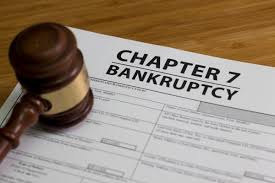Understanding Chapter 7 Bankruptcy: A Fresh Start for Debtors
In today’s complex financial environment, individuals and families often find themselves overwhelmed by debt. When debt becomes unmanageable, Chapter 7 bankruptcy offers a valuable legal option to eliminate most unsecured debts and gain a fresh financial start. Our company, Legal Marketplace CONSULTANT, is dedicated to guiding clients through this process effectively and compassionately.
Chapter 7 bankruptcy, also known as "liquidation bankruptcy," is designed to provide relief to debtors by discharging qualifying debts, thereby freeing them from the legal obligation to repay those debts. It is a federal legal procedure governed by the United States Bankruptcy Code, specifically under Title 11.
What is Chapter 7 Bankruptcy?
Chapter 7 bankruptcy allows individuals to discharge most of their unsecured debts, including credit card balances, medical bills, personal loans, and utility bills. This process instantaneously prevents creditors from continuing collection efforts, garnishments, and lawsuits related to the discharged debts. The goal is to provide debtors with a fresh financial start by completely wiping away many burdensome financial obligations.
Unlike other types of bankruptcy, Chapter 7 involves liquidating available non-exempt assets to pay creditors. However, many essential assets such as a primary residence, necessary vehicles, and personal belongings may be protected under exemptions, enabling individuals to retain their property while eliminating debt.
Who Qualifies for Chapter 7 Bankruptcy?
Not all individuals are automatically eligible to file for Chapter 7 bankruptcy. Qualification depends largely on the debtor’s income and financial situation. The bankruptcy court requires a "means test" to determine if the debtor’s monthly income is low enough to qualify for Chapter 7 relief.
The means test compares the debtor’s current income to the median income for their state. If the income is below the median, eligible individuals generally qualify for Chapter 7 bankruptcy. If it is above the median, the debtor may have to consider Chapter 13 bankruptcy instead, which involves a repayment plan over three to five years.
The Process of Filing Chapter 7 Bankruptcy
Filing for Chapter 7 bankruptcy involves several important steps. Firstly, potential debtors should consult with a qualified bankruptcy attorney to assess their specific situation and determine eligibility. Following the consultation, the formal process begins with filing a petition with the bankruptcy court.
The bankruptcy petition includes detailed information about the debtor’s income, assets, debts, expenses, and financial transactions. It is crucial to provide complete and honest disclosure of all financial information to the court to avoid complications or dismissal of the case.
Once the petition is filed, an automatic stay goes into effect immediately. This stay legally stops creditors from pursuing any collection activities such as phone calls, letters, lawsuits, or wage garnishments.
A bankruptcy trustee is then appointed to oversee the case. The trustee reviews the debtor’s financial disclosures and may liquidate non-exempt assets to pay creditors. Most cases are "no-asset" cases, meaning the debtor keeps all their property if it qualifies for exemptions.
Approximately four months after filing, the court will typically issue a discharge of eligible debts, releasing the debtor from personal liability for those finances. This marks the completion of the Chapter 7 process and the beginning of rebuilding credit and financial stability.
Exemptions: Protecting Your Essential Assets
A significant component of Chapter 7 bankruptcy is the exemption system, which safeguards essential property from liquidation. Exemptions vary by state and federal law, but common categories include:
- Homestead exemption – protection for equity in your primary residence
- Vehicle exemption – coverage for value in your car, motorcycle, or other transportation
- Personal property exemption – protection for clothing, household goods, and tools of the trade
- Retirement accounts – shields many types of retirement savings plans from seizure
- Wildcard exemption – allows protection of certain amounts of property not covered by other exemptions
Selecting appropriate exemptions requires careful analysis of both state and federal exemptions to maximize asset protection. In some cases, debtors may opt to "choose" between sets of exemptions to preserve the most valuable assets.
Benefits of Filing Chapter 7 Bankruptcy
Chapter 7 bankruptcy offers several advantages to individuals struggling with overwhelming debt burdens:
- Immediate relief from creditor harassment through the automatic stay provision.
- Discharge of most unsecured debts within approximately four months of filing.
- Ability to retain exempt property and essential assets to maintain a stable lifestyle.
- A fresh financial start, helping improve future creditworthiness and financial opportunities.
- Relatively streamlined and efficient legal process compared to other types of bankruptcy.
Limitations and Considerations
Despite its benefits, Chapter 7 bankruptcy has limitations that prospective filers should carefully consider:
- Not all debts can be discharged: Student loans, recent tax debts, child support, alimony, and certain fines typically remain payable.
- Filing bankruptcy affects credit reports and will remain on credit history for up to 10 years.
- Repeated filings have restrictions: Debtors must wait between 8 to 10 years to file Chapter 7 bankruptcy again.
- Loss of non-exempt property is possible if substantial valuable assets exist.
- Not all businesses or financial situations qualify or benefit equally from Chapter 7.
Every financial situation is unique, so consulting with an experienced bankruptcy attorney is essential to understanding the right course of action.
Maintaining Honesty and Full Disclosure
One of the most critical elements of a successful Chapter 7 bankruptcy filing is full transparency. Debtors must disclose all assets, income, debts, and recent financial transactions. Attempting to hide assets or misrepresent facts can result in dismissal of the case, denial of discharge, or even criminal penalties.
Our team at Legal Marketplace CONSULTANT emphasizes honesty and integrity throughout the bankruptcy process to ensure clients receive the full benefits of bankruptcy relief safely and effectively.
How Legal Marketplace CONSULTANT Can Help
Navigating the complexities of Chapter 7 bankruptcy can be daunting without professional guidance. Our legal experts specialize in bankruptcy law and have extensive experience assisting clients successfully discharge debt and rebuild their financial lives.
We offer comprehensive consultations to analyze your financial circumstances, determine eligibility, develop a tailored bankruptcy strategy, and prepare all necessary documentation. During the entire process, we provide clear communication and support, protecting your rights and interests.
If you are overwhelmed by debt and considering Chapter 7 bankruptcy, contact Legal Marketplace CONSULTANT through the communication channels provided in our bio or send us a private message for confidential consultation and assistance.
Steps to Take Before Filing Chapter 7 Bankruptcy
Before filing, consider these important preliminary steps to ensure the best outcome:
- Assess all debts, income sources, expenses, and assets comprehensively.
- Consult with a qualified bankruptcy attorney to explore alternatives and confirm eligibility.
- Complete credit counseling from an approved agency as required by the Bankruptcy Code.
- Gather all necessary financial documents such as tax returns, pay stubs, bank statements, and loan documents.
- Prepare to disclose all financial information honestly and accurately.
Rebuilding Your Financial Future After Bankruptcy
Discharging debt through Chapter 7 bankruptcy is the first step toward financial recovery. After the process, it is important to adopt sound financial habits to rebuild credit and stability, including:
- Establishing a budget and managing expenses carefully.
- Using secured credit cards responsibly to rebuild credit history.
- Reviewing credit reports regularly to track progress and dispute errors.
- Maintaining steady income and an emergency savings fund.
- Continuing financial education to make informed money decisions.
Our team at Legal Marketplace CONSULTANT also provides advice and resources for post-bankruptcy financial planning to help clients achieve long-term success.
Chapter 7 bankruptcy offers a vital fresh start for individuals burdened with overwhelming debt. By halting creditor actions, discharging qualifying debts, and protecting essential assets, it provides a legal pathway to financial freedom. However, the process requires honesty, careful planning, and legal expertise.
Legal Marketplace CONSULTANT is committed to assisting clients throughout the Chapter 7 bankruptcy journey. With experienced guidance, you can navigate this challenging time confidently and rebuild your financial future with renewed hope.
Legal Marketplace CONSULTANT offers expert legal assistance in Chapter 7 bankruptcy filings and debt relief strategies. Our specialized team of attorneys and consultants supports you from the initial consultation to final debt discharge, ensuring your rights are protected and your financial goals restored.































